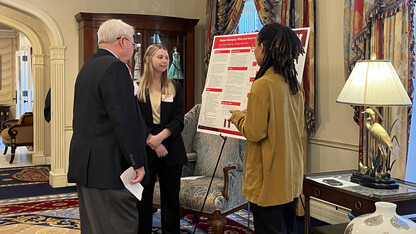· 3 min read
Study shows most parents fail to recognize if their kids are overweight

In Garrison Keillor’s idyllic town of Lake Wobegon, all the children are above average. And, judging by a new study by UNL researchers, none are obese.
Though childhood obesity rates in the United States have tripled in the last 30 years, more than half of parents do not recognize that their child is overweight, according to a new meta-analysis study conducted by UNL graduate student Alyssa Lundahl and Timothy Nelson, assistant professor of psychology.
Seeking a clear answer on when and whether parents realize their children are overweight, Lundahl combined and analyzed data from 69 studies conducted worldwide between 1990 and 2012 that involved children ages 2 to 18. In an article published online Feb. 3 in the journal Pediatrics, Lundahl found that more than 50 percent of parents underestimate the weight of their overweight or obese child.
“This is a topic that has a lot of implications for children and their weight,” Lundahl said. “Parents who underestimate their children’s weight may not encourage healthy eating and physical activities that can optimize their children’s health and reduce their risk of obesity.”
Surprisingly, parents’ perceptions about whether their children are overweight have not changed as childhood obesity rates increased, Lundahl found. Nor are they influenced by obesity rates in the place where they live.
“No matter where you are and no matter what the rate of obesity is in that area, parents are still underestimating the weight of their overweight children,” she said.
Parents of younger children, ages 2 to 5, are less likely to perceive their children as overweight or obese, the study found.
“Perceptions grow more accurate with age,” Lundahl said. “Parents realize it’s not just baby fat any more and they’re not going to grow out of it.”
Parents also are less accurate in judging the size of their sons, believing that normal weight sons are actually underweight.
“There is a belief that boys are supposed to be big and strong,” she said. “If they’re not a little bit bigger, they’re seen as being too small.”
Parents who are overweight also are less likely to accurately assess their children’s weight, the study found.
The study has important implications for pediatricians, Nelson said. Overweight 2- to 5-year-olds are five times more likely than their non-overweight counterparts to be overweight at age 12. Obesity in adolescence is highly predictive of adult weight problems.
“The cases that are missed by parents are actually really unfortunate because those are the cases where early intervention can have some good effects,” Nelson said.
If pediatricians recognize that many parents don’t accurately judge whether their child has a weight problem, they can help parents improve their children’s health by encouraging healthy eating and physical activity, Lundahl said.
Lundahl, who is pursuing a doctorate in clinical psychology, spent about a year on the study. Katherine Kidwell, a fellow UNL graduate student, assisted Lundahl in coding data for the research.









